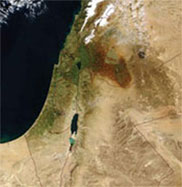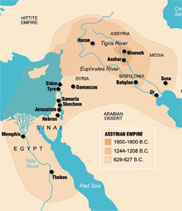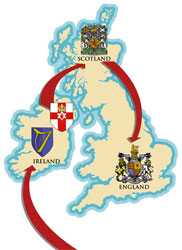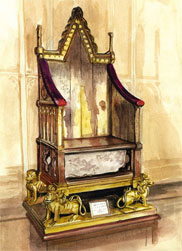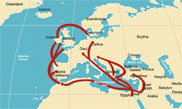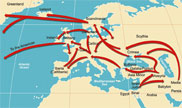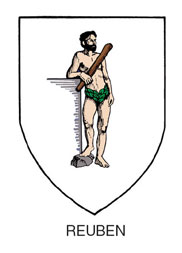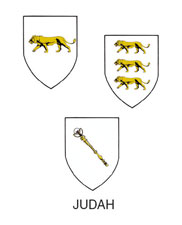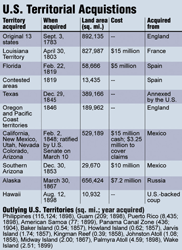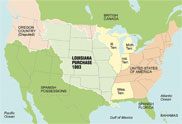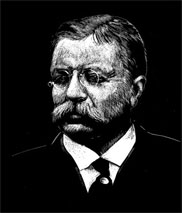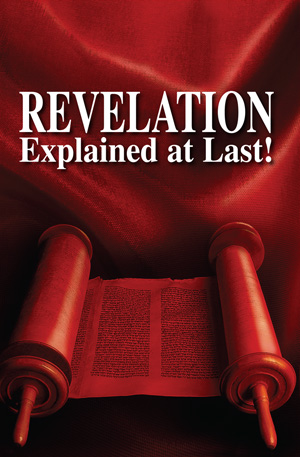Most people will not seek God unless forced to—unless severe trials or other circumstances drive them to God. During good times, most are happy to trust in their own strength, crediting themselves for their successes and achievements, when they may have had little to do with blessings that came to them. On the other hand, these same people generally blame God when things go wrong in their life.
But understand this. God does not and has never owed blessings to anyone. He may choose to bless individuals or nations, for His own purposes, but no one automatically deserves prosperity, wealth, abundance and a generous portion of God’s bounty.
The Bible says that all have sinned (Rom. 3:23), which means all have qualified themselves for death (Rom. 6:23)—and nothing more!
So it is with the peoples of America and Britain. God has bestowed to them astonishing, unparalleled blessings beyond what any nation has ever enjoyed. He has kept His promise to Abraham to make many nations from him and to give the sons of Joseph the promised awesome birthright blessings after two and one-half millennia.
But our peoples have neither been grateful for these birthright blessings, nor sought God, repenting of our national sins!
No Further Obligation
Our peoples have not known that they are Israelites, thinking themselves Gentiles and that the Jews comprise all of modern Israel. How tragically wrong we have been. Yet, we have acted in the same stubborn, rebellious and stiff-necked fashion as ancient Israel. We have been unthankful for what we have received, though it came to us when we had done absolutely nothing to merit it. Instead of ingratitude, we should have sought God and yielded to Him so that such unrivaled blessings could have continued.
But we did not do this, and will not—though we still could!
Since God, after building to it for thousands of years, has now kept His promise, He has no further obligation to continue His birthright blessings—and this He will not do! We learned from Leviticus 26:1-18 how God said that if Israel would not yield to Him after numerous punishments, He would punish them for a full 2,520 years.
After this long withholding of the birthright, it would come time to be fulfilled—and it was—and then would come the following, first, if there were no repentance: “And I will break the pride of your power; and I will make your heaven as iron, and your earth as brass” (Lev. 26:19).
Our national pride is being broken. The decline of Britain is nearly complete, with America to follow soon on her heels. Both these countries have lost their sense of national honor and pride in the extraordinary political, economic and military might they once enjoyed in such splendid grandeur. Now, we are hated, vilified, held in contempt by even the nations we once helped so generously. No matter our true intent or purpose, our motives are constantly impugned. The tiniest of nations no longer fear to spit on or burn the American flag. Insignificant nations now freely ridicule us.
When we are castigated and excoriated abroad, or when our ambassadors and citizens are assassinated, or our embassies bombed, we merely issue anemic protests, crying “foul.” Why? Because God has also kept His promise to “break the pride of [our] power” in front of the nations who once trembled before our mighty power.
When the heavens turn to iron (no rain), the earth turns as hard as brass. No rain means few crops and little food. Thus, God foretold that unprecedented famine and disease will soon follow with such intensity that millions will die.
Imminent Time of Severe Trial
What lies immediately ahead? God’s Word is most plain. The Israelite nations will descend suddenly into a shocking, dramatic decline, with the events of Leviticus 26 and Deuteronomy 28 crashing into complacent, spoiled populations entirely unprepared for what they will experience.
God further inspired Psalm 80 as a description of what is even at this writing coming upon the modern descendants of Israel, and on Joseph—Ephraim and Manasseh—in particular. It reads as a prayer from a people under extreme duress, crying out for God’s intervention: “Give ear, O Shepherd of Israel, You that lead Joseph like a flock; You that dwell between the cherubims, shine forth. Before Ephraim and Benjamin and Manasseh stir up Your strength, and come and save us. Turn us again, O God, and cause Your face to shine; and we shall be saved” (vs. 1-3).
“O Lord God of hosts, how long will You be angry against the prayer of Your people? You feed them with the bread of tears; and give them tears to drink in great measure” (vs. 4-5). Stop and consider this grim, vivid picture for a moment. How bad must times get before nations can be described as having a diet of tears? Their situation is well-known to other peoples as well: “You make us a strife unto our neighbors: and our enemies laugh among themselves” (vs. 6).
Israel’s plea continues, with a summary of its history: “Turn us again, O God of hosts, and cause Your face to shine; and we shall be saved. You have brought a vine out of Egypt: You have cast out the heathen, and planted it. You prepared room before it, and did cause it to take deep root, and it filled the land. The hills were covered with the shadow of it, and the boughs thereof were like the goodly cedars. She sent out her boughs unto the sea, and her branches unto the river” (vs. 7-11).
But at the time to which this psalm looks ahead, they have plummeted far from their once-enviable state: “Why have You then broken down her hedges, so that all they which pass by the way do pluck her? The boar out of the wood does waste it, and the wild beast of the field does devour it” (vs. 12-13).
Literal wild animal attacks will become commonplace. Ezekiel refers to this as well, along with three other national calamities that will descend on the West: “Thus says the Lord God…I send My four sore judgments upon Jerusalem, the sword, and the famine, and the noisome beast, and the pestilence, to cut off from it man and beast” (14:21).
Back to Psalm 80: “Return, we beseech you, O God of hosts: look down from heaven, and behold, and visit this vine; and the vineyard which Your right hand has planted, and the branch that You made strong for Yourself. It is burned with fire, it is cut down [think of out-of-control wildfires]: they perish at the rebuke of Your countenance. Let Your hand be upon the man of Your right hand, upon the son of man whom You made strong for Yourself. So will not we go back from You: quicken us, and we will call upon Your name. Turn us again, O Lord God of hosts, cause Your face to shine; and we shall be saved” (vs. 14-19).
The references to a “branch” and “the man of Your right hand” are clues to the next phase of God working with modern Israel. He will turn and save them, working through a man described as “like unto” Moses (Deut. 18:15), also called the end-time “Elijah” (Matt. 17:11). Just as God used Moses as the leader of ancient Israel, once again He will reinstitute this pattern, again using one holding the office of prophet.
This man’s commission to warn Israel will precede the fullness of the horrors he must tell them about. True to their national character, which God calls “stiff-necked,” or stubborn (Ex. 32:9, 33:3; Deut. 9:6, 13), they will not listen—at first. But when their national troubles grow to be unbearable, they will begin to heed!
(This is just the early phase of God’s intervention in world affairs, eventually leading to the kingdom of God spreading to all nations. Again, to learn much more, read How God’s Kingdom Will Come – The Untold Story!)
First Seven Times, Then Sevenfold
The gross, blatant sin into which Israel has sunk, along with its hard-headed nature, brings the most severe punishment imaginable.
Back to Leviticus 26: “And your strength shall be spent in vain: for your land shall not yield her increase, neither shall the trees of the land yield their fruits” (vs. 20). But this will no more cause national repentance within America and Britain than have any of God’s previous punishments of His people. We will see that only one national calamity has ever brought repentance to Israel.
Next will come this: “And if you walk contrary unto Me, and will not hearken unto Me; I will bring seven times more plagues upon you according to your sins” (vs. 21). The Revised Standard Version better renders this verse, “I will bring more plagues upon you, sevenfold as many as your sins.”
Recall that we read, “And if you will not yet for all this hearken unto Me, then I will punish you seven times more for your sins” in Leviticus 26:18. We learned that the single Hebrew word shibah is translated there as “seven times,” but it could also be translated “sevenfold.” It is clear that “seven times” means duration of the punishment, while “sevenfold” would mean degree or intensity of punishment.
We have seen that, in type, the usage of shibah in verse 18 conveyed duration—2,520 years. But consider. The use of shibah in verse 21 cannot possibly foretell a second 2,520-year withholding of the birthright that God had already bestowed. The most cursory look at today’s world conditions tells you there cannot be time for another 2,520 years before the last days and Christ’s Return. This makes it obvious that the use of shibah in verse 21 must mean sevenfold in intensity, this time including plagues within God’s promised punishment for His people.
The account centering in Daniel 3:19, in which King Nebuchadnezzar ordered that the furnace be made “seven times hotter” so that it would burn up Daniel’s three friends who were to be thrown into it, makes it easy to understand the difference between duration and intensity in Leviticus 26.
Yes, modern Ephraim and Manasseh are rushing headlong into a punishment so awful, so staggering—so intense—as to nearly defy description. What lies ahead for our peoples is truly as terrible as the birthright blessings were wonderful. The cesspool of rottenness and perversity—of every heinous sin—of every evil imaginable, has risen as a stench to God’s throne. Degeneration, followed by rampant immorality, and now amorality, has become the social norm. The scourge of pornography is literally everywhere. Same-sex marriage is here. And routine mass murder, politely called “abortion” and “a woman’s right,” is an abomination for the ages.
Truly, a punishment sevenfold as severe as the level of national sins (vs. 21), now routinely committed by countless millions of our people, is a chastisement poured out—unleashed by god—beyond belief!
Of course, all the previously described punishments of the 2,520-year times of Leviticus 26:1-18, also reapply. For instance, recall that God said He would “appoint terror” over His people if they did not obey Him. None can doubt that this is now happening in a way never seen in our nation’s history—and no man or government can stop what God has appointed.
Be careful you do not say, “But this could never happen to America and Britain.” Do not assume we earned such marvelous blessings by our own ingenuity, forgetting that they were simply the fulfillment of a great promise made 4,000 years ago. This assumption supposes that we will always be able to rescue ourselves from any national dilemma because we were able to bring these blessings on ourselves. We were not—they were given to us!
The same God who once sent Israel and Judah into captivity can do it again. The facts are in! The handwriting is on the wall—and you need to wake up to the reality of what has already happened to Britain’s greatness, with America soon to follow her decline! And yet, the steepest decline—and complete crash—has yet to occur even to Britain. What lies ahead is so horrible, so awful—so truly terrible!—that you must shake yourself to understand!
Three Increases in Intensity
The balance of the Leviticus 26 and Deuteronomy 28 prophecies are vital to understand. They will soon affect you and all those around you in the most shocking fashion.
It is now clear that the first wave of increased punishment involves plagues of drought and famine, and the resultant disease epidemics that always follow in their wake. Will this cause people to consider the cause of the plagues—the cause of their suffering? Will they connect their punishment to being the consequences of sin? Sin is the transgression of God’s perfect spiritual Law (Rom. 7:14; I John 3:4). When laws are broken, automatic penalties result.
Our material possessions will be systematically stripped away, at a faster rate than before. Of course, most have been schooled and conditioned to the idea that it is material wealth and prosperity that bring happiness and true success in life. How utterly false is this hollow thinking, which ignores the truth that real happiness flows from obedience to God’s holy, righteous Law (Rom. 7:12; Psa. 119:172). But men do not consider the great law of cause and effect, and deny that misery, heartache, emptiness, depression, mental ills and almost constant unhappiness have anything to do with right and wrong.
How mistaken they are!
Because our peoples will not repent at the first sevenfold increase in punishment (drought, famine and disease), God promised a horrible new second element would enter His equation to correct His people—slavery: “And if you will not be reformed by Me by these things, but will walk contrary unto Me; Then will I also walk contrary unto you, and will punish you yet seven times [RSV: sevenfold] for your sins. And I will bring a sword upon you, that shall avenge the quarrel of My covenant: and when you are gathered together within your cities, I will send the pestilence among you; and you shall be delivered into the hand of the enemy” (Lev. 26:23-25).
There is no misunderstanding what “delivered into the hand of the enemy” means. The second increase in punishment is captivity, national slavery. Once again, God has done it before—and He intends to do it again! Can you grasp this? Does it seem too much to believe—that our people could actually be taken as slaves to a foreign land? But it is the only punishment that has ever awakened Israel from her stubborn, rebellious disobedience—and God says it will happen!
But this is not all. A third sevenfold multiplication of punishment, this time of different plagues follows: “And if you will not for all this hearken unto Me, but walk contrary unto Me: then I will walk contrary unto you also in fury; and I, even I, will chastise you seven times [RSV: sevenfold] for your sins” (vs. 27-28).
The prophecy continues: “and I will scatter you among the heathen, and will draw out a sword after you: and your land shall be desolate, and your cities waste” (vs. 33). The Revised Standard Version says, “And I will lay your cities waste…And I will scatter you among the nations” (vs. 31-33). This third successive sevenfold punishment clearly involves special plagues, the devastation of cities through nuclear war and, now, complete slavery for all who survive, as they are transported for servitude “among the nations.”
Also, when God speaks of punishing “in fury,” it is a reference to the Day of God’s Wrath, most commonly called the Day of the Lord. This specifically refers to the seven last plagues of Revelation 15:1, which are poured out on all nations of the world, because God will punish every person and every nation who disregards His laws.
Why God Sends Punishment—Plagues
The God of the Bible is a God of love (I John 4:8, 16). He sacrificed His Son, because of His love for the world (John 3:16). God is also a Parent, and like any human parent, and far more so, He loves His children, and the peoples of the world are His children, despite their rebellious condition today.
Also, like any wise human parent, God uses corporal punishment to discipline His children. Proverbs 3:11-12 states, “…despise not the chastening of the Lord; neither be weary of His correction: for whom the Lord loves He corrects; even as a father the son in whom he delights.” Quoting this proverb, the apostle Paul adds that God “chastens, and scourges [to afflict with severe punishment and pain] every son whom He receives” (Heb. 12:6).
This describes what is coming upon America and Britain. But a fair, just and loving God never punishes people before He warns them. This book is a warning to any who will listen!
The record of history is that most have not welcomed God’s warning!
When Christ came to earth announcing God’s kingdom, He was tortured and crucified. Every one of the apostles, with the likely exception of John, was put to death, often after imprisonment, sometimes including torture.
Time could be taken to describe the prophets of old who warned nations, kings and peoples to repent and to acknowledge God as sovereign over their lives. These men were placed in dungeons, forced to flee for their lives, stoned, sawn in two, or otherwise killed in most cruel fashion. Invariably, they were rejected and ignored. Noah preached for 120 years and only a few of his own family heeded.
Our stiff-necked, rebellious, pleasure-seeking nations have never heeded the true servants of God. Except for a tiny few individuals, my words here—really God’s Words—will not change anyone. I fully understand in fact that these truths will make some people intensely angry.
But these are the plain words of God about how He works with people. We are about to read of terrible plagues to be poured out on a God-hating, truth-rejecting, self-willed, rebellious modern Israel. This punishment is coming for a reason. Four thousand years of ignoring God’s commands have come to the full—and God is filled with fury!
God’s three times sevenfold chastisement is correction of His people. But human beings, having human nature, will not enjoy the correction, possibly initially thinking it is unfair—that our peoples do not really deserve it. This is because people want to be thought of as good, but they do not want to do good—to do what is right! Most will be initially stubborn, deceiving themselves (Jer. 17:9) about what have been their ways. But powerful correction will soon soften this stubbornness.
Any sampling of sermons given by the professing Christian ministers of this world’s false Christianity include a liberal mentioning of “God’s love” for mankind or for you. Why do they never speak about how God’s love requires Him to punish for disobedience? But disobedience to what?—the very law that these same ministers refuse to tell people is binding upon our peoples today! The ministers of this world have utterly failed in their responsibility. They have been derelict in their duty in warning people that sin brings consequences—none of them good!
But God’s correction will ultimately get people’s attention in the only way left for Him to do this. The modern nations of Israel will come to recognize what their sins have done to them—that they did these things to themselves. Their spirit of national rebellion will be shattered, finally disappearing, as God’s chosen people become a people corrected—an obedient people. They will learn that spiritual happiness vastly exceeds the value of physical blessings and material prosperity.
Recall that the scepter promise involved more than the House of David always having a human king to sit on God’s throne prior to Christ’s Return. Rather, it points directly to spiritual salvation for all in Christ. Had Israel retained God as their King—and not rebelled against His rule—there would never even have been a need for human kings to fulfill The Davidic Covenant. God always intended that His people focus on the bigger picture of spiritual happiness and prosperity.
Punishment Certain
God’s warnings through His prophets are still recorded in His Word for us today. They show the absolute certainty of God’s purpose to punish His chosen people. He called and chose them for a wonderful purpose (Ex. 19:5; Deut. 4:5-8; Isa. 43:21) more glorious than they were willing to understand, and they rejected Him—and still do today!
Isaiah, Jeremiah, Ezekiel, Daniel, Joel, Hosea and others prophesied great punishments to come upon our peoples. What Moses foretold, Christ also foretold. But all of this has remained locked up from all who do not understand or will not accept the identity of our peoples throughout these awesome, apocalyptic prophecies.
But within this understanding, it must be recognized that God is chastening people He loves. He has always wanted human beings to enjoy spiritual values and principles, having His Holy Spirit guiding and directing their lives, after having come to deep repentance—both as individuals and nations.
Again, some few individuals will yet repent, and will be spared the horrible prophecies we will now examine. This could include you.
Already Worsening Conditions
The pride of American and British power continues to be broken, with our leaders in fear of what our critics and enemies—and the ever relentless press—will say. Authoritative leadership and decision-making is now systematically undercut and checkmated by this endless chorus of professional naysayers. Also, any leader daring to even hint that God might be involved in the affairs of men is virtually lampooned—and accused of crossing boundaries between church and state. God never intended such an unnatural state.
As both manmade and natural disasters increase in number and intensity, it is evident God’s protection around His people is even now being withdrawn. Headlines daily blare warnings of budget shortfalls, economic problems, growing social problems, war, mass murders, terrorist attacks, difficulties and uncertainties, bitterly divided government, enormous problems in our schools and families, and much more!
All this will soon grow infinitely worse as God also turns our foreign political “lovers” against us (Ezek. 23:22; Jer. 4:30).
An Astonishing and Specific Prophecy
What we have read above is only the beginning of what God says is yet to happen. The book of Micah, carrying special insight into our pride being broken, our loss of possessions and sea gates around the world, and worsening weather conditions, serves as its own tremendous proof of who and where are the peoples of Israel today. Simply reading this prophecy identifies America and Britain as the only nations that have fulfilled what is described in Micah 5.
Notice the enormous wealth, and ensuing downfall, of the people described, beginning in verse 7, as the “remnant of Israel.” Note that references to “dew” and “showers” have a direct bearing on agricultural productivity and reflect the direct blessings of God: “And the remnant of Jacob shall be in the midst of many people [nations] as a dew from the Lord, as the showers upon the grass, that tarried not for man, nor waited for the sons of men.”
Recall that, anciently, Joseph himself stored food in Egypt and helped other peoples and nations as a result. When God’s blessings were still being poured out upon our peoples without measure (though we, unlike Joseph, have been rebelling against God’s Law and Way), over and over, our blessings became blessings to other nations of the world. This same spirit in modern Joseph—Ephraim and Manasseh—gave birth to the Alliance for Progress, Marshall Plan, Hoover Program, Four Point Program and so many others that saved millions from starvation after World War I and World War II. No other nations ever did any of these things, let alone all of them.

BLESSINGS REMOVED: God prophesied He would appoint terror over Israel. The second day in American history to “forever live in infamy,” Sept. 11, 2001, is but a foretaste of the severe punishment that will yet come upon our nations for continuing to ignore the God who has blessed them. America and Britain will also experience famine and pestilence (disease) on an unprecedented scale. Seemingly eradicated diseases will return to wreak havoc on unsuspecting nations.
The next verse depicts this “remnant of Israel” as a lion among all other nations on Earth. As a forerunner, it was as a lion that America entered these two terrible wars and pulled the world back to temporary peace—until God’s final time had come. Notice: “And the remnant of Jacob shall be among the Gentiles in the midst of many people as a lion among the beasts of the forest, as a young lion among the flocks of sheep: who, if he go through, both treads down, and tears in pieces, and none can deliver” (vs. 8).
Who can doubt that this describes what have been the roles of America and Britain?
The next scripture pictures what these two countries did throughout the nineteenth century and into the twentieth century, until they could no longer win wars in countries as small as Korea and Viet Nam: “Your hand shall be lifted up upon your adversaries, and all your enemies shall be cut off” (vs. 9).
Invariably, in wars and skirmishes, this is exactly what America and Britain did to their adversaries and enemies. Our enemies were always cut off!
Shocking Devastation
At this point, God’s description of His people takes a sharp turn: “And it shall come to pass in that day, says the Lord, that I will cut off your horses [Moffatt: “war horses”] out of the midst of you, and I will destroy your chariots [tanks, ships, aircraft, missiles]: and I will cut off the cities of your land, and throw down all your strongholds [military bases]” (vs. 10-11). Since God says that He controls the outcome of war (Psa. 33:10-19), have no doubt that He will fulfill this prophecy.
Men now often speak of “disarming” terrorists, rogue dictators and their nations. This passage is God’s promise to literally disarm His own people. Micah explains why He will do this: “And I will cut off witchcrafts out of your hand; and you shall have no more soothsayers: your graven images [idols] also will I cut off, and your standing images [idols] out of the midst of you; and you shall no more worship the work of your hands. And I will pluck up your groves out of the midst of you: so will I destroy your cities” (vs. 12-14).
God is tired of looking at modern “Churchianity,” which condones rank idolatry, spawns soothsayers (false ministers), condones sexual perversion and tolerates now widespread abominable witchcraft. These modern soothsayers should have thundered from their pulpits that if God’s Law continues to be broken, the penalty is that the country doing this will also be “broken” as a natural consequence.
“A Controversy with All Flesh”
Since the Bible shows that Israel is the first to receive salvation, she is also the first to receive chastening and punishment. But the next verse in Micah’s prophecy shows that God’s punishment, after dealing with America and Britain, includes punishment on all nations: “And I will execute vengeance in anger and fury [in a Day of the Lord] upon the heathen, such as they have not heard” (vs. 15).

DROUGHT AND FAMINE: God will pour out severe drought, famine and locusts, with other plagues, upon the modern-day descendants of Israel.

INSTANT POVERTY: This will also be the result for some who have never known anything but plenty.
God cares about all human beings—and the entirety of humanity has ignored Him and rejected His ways and laws. While Israel was taught and understood these laws more personally, all nations, starting at Creation with Adam and Eve in the Garden, have disobeyed the true God. But it has been God’s intention from Creation to fashion every human being in His own character and likeness (Gen. 1:26). This is why Paul was commissioned to preach the gospel to Gentile nations.
God will have used these nations as part of the punishment for His people Israel. But Scripture shows that they relish this role too much—taking unbridled delight in Israel’s suffering and downfall. For this, they too must face consequences.
Mind-numbing terror, springing from international chaos, lies just beyond the view of leaders, nations and billions of people hurtling toward this disaster. Every continent, nation and tribe of earth will be sucked into the vortex of what must now occur because of the wretchedness, violence, corruption, degeneration, war, strife and oppression practiced worldwide.
Jeremiah expands on what Micah prophesied: “A noise shall come even to the ends of the earth; for the Lord has a controversy with the nations, he will plead with all flesh…” (Jer. 25:31). Since all Gentile peoples—“the heathen”—are God’s children, His love for them requires Him to also punish non-Israelite countries. Ultimately, every nation must learn to submit to the wonderful government of god. Every nation must come to recognize that God’s Way brings supreme happiness and joy!
Other prophecies reveal that this will happen.
Verse 31 shows that God first “pleads” with those He is about to punish. This pleading to “all flesh” includes a warning of exactly what will follow if they do not listen. My books and our other publications, reaching every country on Earth, are God’s patient pleading with humanity before time runs out and this occurs: “…He will give them that are wicked to the sword…Thus says the Lord of hosts, Behold, evil shall go forth from nation to nation, and a great whirlwind shall be raised up from the coasts of the earth” (vs. 31-32).
“Jacob’s Trouble”
Before reading the next prophecy in Jeremiah, recall that Jacob conferred his name on Ephraim and Manasseh (Gen. 48:16). The following stark prophecy is therefore directed specifically at the United States and British nations: “For thus says the Lord; We have heard a voice of trembling, of fear, and not of peace. Ask you now, and see whether a man does travail with child? Wherefore do I see every man with his hands on his loins, as a woman in travail, and all faces are turned into paleness? Alas! For that day is great, so that none is like it: it is even the time of Jacob’s trouble” (Jer. 30:5-7).
Take careful note that Jeremiah says this period of national trial—“Jacob’s trouble”—is so great that “none is like it.” This means it is unparalleled in history.
Many assert that this prophecy speaks of ancient Israel. That is false. It has to be talking about modern Israel, because the rest of verse 7 concludes with “and he shall be saved out of it,” immediately followed by “For it shall come to pass in that day, says the Lord of hosts, that I will break his yoke from off your neck, and will burst your bonds, and strangers shall no more serve themselves of him: but they shall serve the Lord their God, and David their king, whom I will raise up unto them” (vs. 8-9).
Savor this extraordinary portion of the prophecy. God’s deliverance of Israel from slavery is as certain as is the horrible punishment that precedes this. At what time? Notice: “The fierce anger of the Lord shall not return, until He have done it, and until He have performed the intents of His heart: in the latter days you shall consider it” (vs. 24). This is our time—now!
Daniel Confirms Jeremiah
One more reference must be examined regarding this terrible time of national corrective sevenfold chastisement by God of His chosen people: “And at that time shall Michael stand up, the great prince which stands for the children of your people [Israel]: and there shall be a time of trouble, such as never was since there was a nation even to that same time…” (Dan. 12:1).
Let’s state this plainly one last time for emphasis. There cannot now be three separate times that are the worst in all history! In every case (tying Luke 21 to Matthew 24 does this), this prophecy is described as the worst period to ever strike civilization—with the initial and worst brunt of the punishment landing directly on the people of whom the patriarch Israel said, “Let my name be named on them”—Ephraim and Manasseh.
There can be no misunderstanding that these prophecies converge on the United States and Britain, and reflect the worst punishment God has ever handed out to any peoples. Do not believe me. Believe Christ, and both Daniel and Jeremiah, who were inspired of God.
But there is good news! Israel shall be delivered by Christ from enslavement, for the prophecy continues: “…and at that time your people [Israel] shall be delivered, every one that shall be found written in the book. And many of them that sleep in the dust of the earth shall awake [the resurrection of the dead], some to everlasting life, and some to shame and everlasting contempt” (vs. 1-2).
Ezekiel Explains Jacob’s Trouble
Throughout his extensive prophecy, Ezekiel describes the coming sevenfold intensity of God’s coming chastisement of America and Britain. His picture is graphic—and horrible: “A third part of you shall die with the pestilence, and with famine shall they be consumed in the midst of you: and a third part shall fall by the sword round about you; and I will scatter a third part into all the winds, and I will draw out a sword after them. Thus shall My anger be accomplished, and I will cause My fury to rest upon them, and I will be comforted: and they shall know that I the Lord have spoken it in My zeal, when I have accomplished My fury in them” (5:12-13).
Chapter 6 adds this: “In all your dwelling places the cities shall be laid waste…” (vs. 6). What else but nuclear devastation is being described here? Take note of God’s using the word “all” when describing the destruction of our cities.
Will you be among the vast majority who ridicule God’s words as being “radical” or “extreme”?
The prophet Joel adds many specifics to what will happen. Notice this graphic description of what will happen, beginning with our fruit trees and crops infected by an invasion of locusts: “He has laid My vine waste, and barked My fig tree: he has made it clean bare, and cast it away; the branches thereof are made white…” (1:7).
Drought appears next: “The field is wasted, the land mourns; for the corn is wasted: the new wine is dried up, the oil languishes. Be you ashamed, O you husbandmen [farmers]; howl, O you vinedressers, for the wheat and for the barley; because the harvest of the field is perished. The vine is dried up, and the fig tree languishes; the pomegranate tree, the palm tree also, and the apple tree, even all the trees of the field, are withered: because joy is withered away from the sons of men…” (vs. 10-12).
Verse 15 shows that destructive plagues are about to come as part of this Day of the Lord: “Alas for the day! For the day of the Lord is at hand, and as a destruction from the Almighty shall it come…” (vs. 15).
Verses 17-20 describe greatly worsening drought: “The seed is rotten under their clods, the garners are laid desolate, the barns are broken down; for the corn is withered. How do the beasts groan! The herds of cattle are perplexed, because they have no pasture; yes, the flocks of sheep are made desolate. O Lord, to You will I cry: for the fire has devoured the pastures of the wilderness, and the flame has burned all the trees of the field. The beasts of the field cry also unto You: for the rivers of waters are dried up, and the fire [forest and prairie fires, with heat waves and hot, blasting winds] has devoured the pastures of the wilderness.”
Chapter 2 continues the prophecy, explaining that the Day of the Lord is now almost here: “Blow you the trumpet in Zion, and sound an alarm [of war and military defeat] in My holy mountain: let all the inhabitants of the land tremble: for the day of the Lord comes, for it is near at hand…” (vs. 1).
A Remnant of Israel Survives
Some in national Israel will awaken as a result of the punishment that will then be behind them, but it appears that only a tenth—perhaps 30 million out of roughly 300 million alive today—will remain!
Isaiah records, “…the cities [are] wasted without inhabitant, and the houses without man, and the land [is] utterly desolate, and the Lord has removed men far away, and there is a great forsaking in the midst of the land. But yet in it shall be a tenth, and it shall return, and shall be eaten: as a teil tree, and as an oak, whose substance is in them, when they cast their leaves: so the holy seed shall be the substance thereof” (6:11-13).
Take a moment to let those words sink in. The national character of modern Israel has sunk so far that a loving God allows 9 of every 10 of His people to perish! This is the same God who would “have all men to be saved” (I Tim. 2:4) and is “not willing that any should perish” (II Pet. 3:9). This would of course include all the descendants of Israel. In this case, a temporary loss of physical life will ultimately work toward the goal of helping this final generation to inherit eternal life.
Yes, this terrible winnowing of the Israelite population is not the end of the story. The horror of this time will be surpassed by the joy that defines the wonderful times that follow, as we will see momentarily.
Israel Finally Repents!
Here are God’s encouraging words to the surviving remnant of His people: “Therefore also now, says the Lord, turn you even to Me with all your heart, and with fasting, and with weeping, and with mourning: and rend your heart, and not your garments, and turn unto the Lord your God: for He is gracious and merciful, slow to anger, and of great kindness, and repents him of the evil” (Joel 2:12-13).
This verse describes many millions who will turn to God in deep repentance, recognizing that national sins brought God’s loving correction upon His people. Recall that Jeremiah 30 ended with “in the latter days you shall consider it.” We are in the last of the “latter days.” Actually, the prophecy continues right into chapter 31: “At the same time, says the Lord, will I be the God of all the families of Israel, and they shall be My people. Thus says the Lord, The people which were left of the sword [all survivors] found grace in the wilderness; even Israel, when I went to cause him to rest…” (vs. 1-2).
The Moffatt version renders this, “Those who survive the sword shall find grace in the dungeon”—of enslavement.
Now continue the prophecy: “Again I will build you, and you shall be built, O virgin of Israel: you shall again be adorned with your tabrets, and shall go forth in the dances of them that make merry. You shall yet plant vines upon the mountains of Samaria: the planters shall plant, and shall eat them as common things. For there shall be a day, that the watchmen upon the mount Ephraim [the survivors of Britain and America] shall cry, Arise you, and let us go up to Zion unto the Lord our God…They shall come with weeping, and with supplications will I lead them: I will cause them to walk by the rivers of waters in a straight way, wherein they shall not stumble: for I am a Father to Israel, and Ephraim is My firstborn. Hear the word of the Lord, O you nations, and declare it in the isles afar off [the British Isles], and say, He that scattered Israel will gather him, and keep him, as a shepherd does his flock” (vs. 4-6, 9-10).
Chapter 50 of Jeremiah adds more to this prophecy: “In those days, and in that time, says the Lord, the children of Israel shall come, they and the children of Judah together, going and weeping: they shall go, and seek the Lord their God. They shall ask the way to Zion with their faces thitherward, saying, Come, and let us join ourselves to the Lord in a perpetual covenant that shall not be forgotten. my people have been lost sheep: their shepherds have caused them to go astray, they have turned them away on the mountains: they have gone from mountain to hill, they have forgotten their resting place” (vs. 4-6).
Later in the same chapter comes this: “In those days, and in that time, says the Lord, the iniquity of Israel shall be sought for, and there shall be none; and the sins of Judah, and they shall not be found: for I will pardon them whom I reserve” (vs. 20).
The First Dominion and Resurrection of All Israel
Following this unprecedented national punishment, God begins working with Israel anew. Through the human leadership of the aforementioned prophet “like unto Moses” called “Elijah,” these peoples will be brought from the lowest point in their entire history—far worse than its bondage in Egypt!—to become the model nation that God always intended it to become.
A picture of this time is found in the book of Micah: “But in the last days it shall come to pass, that the mountain of the house of the Lord shall be established in the top of the mountains, and it shall be exalted above the hills; and people shall flow unto it. And many nations shall come, and say, Come, and let us go up to the mountain of the Lord, and to the house of the God of Jacob; and He will teach us of His ways, and we will walk in His paths: for the law shall go forth of Zion, and the word of the Lord from Jerusalem. And He shall judge among many people, and rebuke strong nations afar off; and they shall beat their swords into plowshares, and their spears into pruninghooks: nation shall not lift up a sword against nation, neither shall they learn war anymore” (4:1-3). Here is a picture of Israel as the leading peoples of the entire Earth, setting an example that draws others from around the world.
“But they shall sit every man under his vine and under his fig tree; and none shall make them afraid: for the mouth of the Lord of hosts has spoken it. For all people will walk every one in the name of his god [probably better translated “judge”—a team of trained leaders under Christ], and we will walk in the name of the Lord our God forever and ever. In that day, says the Lord, will I assemble her that halts, and I will gather her that is driven out, and her that I have afflicted; And I will make her that halted a remnant, and her that was cast far off a strong nation: and the Lord shall reign over them in mount Zion from henceforth, even forever” (vs. 4-7).
The last verse in this passage holds a name that God gives to this phase of His plan, during which His kingdom is restored to Israel, prior to its spreading to all other nations: “And you, O tower of the flock, the strong hold of the daughter of Zion, unto you shall it come, even the first dominion; the kingdom shall come to the daughter of Jerusalem” (vs. 8).
But there is much more to learn about this time—and it is staggering. Ezekiel contains a prophecy of this period, with one called “the Son of man,” typed by the ancient Ezekiel himself, participating in a pivotal moment in the history of God working with human beings: “The hand of the Lord was upon me, and carried me out in the spirit of the Lord, and set me down in the midst of the valley which was full of bones, and caused me to pass by them round about: and, behold, there were very many in the open valley; and, lo, they were very dry. And He said unto me, Son of man, can these bones live? And I answered, O Lord God, You know. Again He said unto me, Prophesy upon these bones, and say unto them, O you dry bones, hear the word of the Lord. Thus says the Lord God unto these bones; Behold, I will cause breath to enter into you, and you shall live: And I will lay sinews upon you, and will bring up flesh upon you, and cover you with skin, and put breath in you, and you shall live; and you shall know that I am the Lord” (37:1-6). This is clearly a resurrection—in this case not a change to the status of spirit being, but rather a restoration to physical life.
The prophecy continues: “So I prophesied as I was commanded: and as I prophesied, there was a noise, and behold a shaking, and the bones came together, bone to his bone. And when I beheld, lo, the sinews and the flesh came up upon them, and the skin covered them above: but there was no breath in them. Then said He unto me, Prophesy unto the wind, prophesy, son of man, and say to the wind, Thus says the Lord God; Come from the four winds, O breath, and breathe upon these slain, that they may live. So I prophesied as He commanded me, and the breath came into them, and they lived, and stood up upon their feet, an exceeding great army. Then He said unto me, Son of man, these bones are the whole house of Israel: behold, they say, Our bones are dried, and our hope is lost: we are cut off for our parts. Therefore prophesy and say unto them, Thus says the Lord God; Behold, O My people, I will open your graves, and cause you to come up out of your graves, and bring you into the land of Israel” (vs. 7-12).
So very plain! At this time, billions of Israelites—from the earliest descendants of the patriarch Jacob, all the way to those who were very recently slain in the calamitous time of Jacob’s trouble, will be brought back!
This is an advance forerunner of a later period when all other peoples from all ages will be resurrected and given a chance to learn God’s Way, often referred to as the “Great White Throne Judgment” period (Rev. 20:11-13).
Other passages make clear that at this point, Israel will be the dominant peoples on Earth—again, the model nation to which others will naturally “flow.”
This hope—understood and taught only by God’s true Church—will help carry Israel’s survivors through the devastating suffering that lies directly ahead!
Hosea’s Prophecy for Today
The prophet Hosea brought a remarkable prophecy that applies to the House of Israel. It describes them in a pathetic condition, having lost all knowledge of the true God. Hosea, probably more than any other prophet, captures the big picture overview of God’s relationship with Israel, her rebellion, their divorce, the postponement of her birthright for 2,520 years, a detailed picture of her national attitude now—including her severe final punishment prior to her complete repentance and restoration to God.
God intended that Hosea personally reflect a type of Israel’s entire history with God. In order to picture God’s relationship to Israel, Hosea was required to marry a whore, who bore Him a son named Jezreel. This means “God will disperse.” Here is why this name was chosen: “And the Lord said unto him, Call his name Jezreel; for yet a little while, and I will avenge the blood of Jezreel upon the house of Jehu, and will cause to cease the kingdom of the house of Israel. And it shall come to pass at that day, that I will break the bow of Israel in the valley of Jezreel” (1:4-5).
The Assyrian captivity of 721-718 BC did bring the kingdom of Israel to an end for two and one-half millennia.
Hosea’s wife next bore a daughter named Lo-ruhamah, meaning “no mercy.” Here is why: “And she conceived again, and bore a daughter. And God said unto him, Call her name Lo-ruhamah: for I will no more have mercy upon the house of Israel; but I will utterly take them away” (vs. 6).
Finally, this harlotrous wife had a second son: “Then said God, Call his name Lo-ammi: for you are not My people, and I will not be your God” (vs. 9).
Here, God describes Israel as “Loammi,” which means “not My people,” because by Hosea’s time, they had rejected God. How tragic today that the modern tribes of Israel do not know that they were God’s people, that they are Israelites as much as are the Jews. What a shock it will be to the system to find out that they are the people of God once again, and could have been all along. You may be one of many thousands who will learn this astounding truth by reading this book.
So then, the next two verses complete the picture of Israel’s 4,000-year relationship with God: “Yet the number of the children of Israel shall be as the sand of the sea, which cannot be measured nor numbered; and it shall come to pass, that in the place where it was said unto them, You are not My people, there it shall be said unto them, You are the sons of the living God. Then shall the children of Judah and the children of Israel be gathered together, and appoint themselves one head, and they shall come up out of the land [Moffatt translates this as “spread out far beyond their land”]: for great shall be the day of Jezreel” (vs. 10-11). This is yet another glimpse of the Kingdom of Israel restored—the First Dominion.
During her migration from Assyria to her lands in Northwest Europe, Israel was prophesied to get confused about her “paths.” Notice: “Therefore, behold, I will hedge up your way with thorns, and make a wall, that she shall not find her paths” (Hos. 2:6).
This prophecy reveals that Israel was to lose her identity!
Here is why: “For she did not know that I gave her corn, and wine, and oil, and multiplied her silver and gold, which they prepared for Baal” (vs. 8). These are direct prophecies that speak of America and Britain now. Our peoples have rebelled and forgotten how much God has given them!
All this comes at a great price for rebellious Israel. Notice how the blessings begin to disappear: “Therefore will I return, and take away My corn in the time thereof, and My wine in the season thereof, and will recover My wool and My flax given to cover her nakedness” (vs. 9).
Yes, terrible punishment is coming from the hand of God! Hosea repeats what we have seen in other places—massive drought and disease epidemics will devastate the nations of modern Israel, followed by horrific invasion and captivity for our peoples. It is coming soon. All who doubt this will soon wish they had not. All who scoff will soon scoff no more!
The culmination of this prophecy is found in verses 14-23.
Israel Returns to God
Let’s carefully read this lengthy but vital passage in Hosea. It describes God talking to Israel while she is in slavery, but then ready to hear His instruction: “Therefore, behold, I will allure her, and bring her into the wilderness, and speak comfortably unto her. And I will give her her vineyards from there, and the valley of Achor for a door of hope: and she shall sing there, as in the days of her youth, and as in the day when she came up out of the land of Egypt. And it shall be at that day, says the Lord, that you shall call Me Ishi [my Husband]; and shall call Me no more Baali. For I will take away the names of Baalim out of her mouth, and they shall no more be remembered by their name. And in that day will I make a covenant [the New Covenant] for them…And I will betroth you unto Me forever…in righteousness, and in judgment, and in loving kindness, and in mercies. I will even betroth you unto Me in faithfulness: and you shall know the Lord. And it shall come to pass in that day, I will hear, says the Lord…and I will have mercy upon her that had not obtained mercy; and I will say to them which were not My people, you are my people; and they shall say, you are my God” (2:14-23).
The context of God’s present statement and final message to Israel picks up at the outset of chapter 4: “Hear the word of the Lord, you children of Israel: for the Lord has a controversy with the inhabitants of the land, because there is no truth, nor mercy, nor knowledge of God in the land. By swearing, and lying, and killing, and stealing, and committing adultery, they break out, and blood touches blood. Therefore shall the land mourn, and every one that dwells therein shall languish, with the beasts of the field, and with the fowls of heaven; yes, the fishes of the sea also shall be taken away” (vs. 1-3). This passage speaks of Britain and America, their lands and the conditions of all inhabitants, human and animals.
The next section is directed specifically to the ministers of the churches throughout America and Britain. Here is God’s blunt message to them about the cause of the appalling conditions and lack of character described above: “My people are destroyed for lack of knowledge: because you have rejected knowledge, I will also reject you, that you shall be no priest to Me: seeing you have forgotten the law of your God, I will also forget your children. As they were increased, so they sinned against Me: therefore will I change their glory into shame” (vs. 6-7).
The description picks up again later in the chapter: “For Israel slides back as a backsliding heifer: now the Lord will feed them as a lamb in a large place” (vs. 16).
Beginning with chapter 4, the brunt of the warning has been primarily to Britain. Notice this in chapter 5: “Ephraim [Britain] shall be desolate in the day of rebuke: among the tribes of Israel have I made known that which shall surely be” (vs. 9).
Yet finally, our peoples will respond to God: “I will go and return to My place, till they acknowledge their offense, and seek My face: in their affliction they will seek Me early” (5:15).
After the horrible punishment that is to fall on our peoples is complete, they will cry out to God, seeking His forgiveness and deliverance from enslavement. This verse does, in fact, show God knows that Israel “in their affliction…will seek Me early.”
How wonderful this will be!
What Has Been Our Work!
But God’s indictment of Britain (with America) continues in chapter 7: “Ephraim, he has mixed himself among the people; Ephraim is a cake not turned [half-baked]. Strangers have devoured his strength, and he knows it not: yes, gray hairs are here and there upon him, yet he knows not. And the pride of Israel testifies to his face: and they do not return to the Lord their God, nor seek Him for all this. Ephraim also is like a silly dove without heart: they call to Egypt, they go to Assyria. When they shall go, I will spread My net upon them; I will bring them down as the fowls of the heaven; I will chastise them, as their congregation has heard” (Hos. 7:8-12).
To a degree, God’s warning has gone into the nation of Britain, beginning in 1953, with The World Tomorrow radio program. Truly, her “congregation has heard” God’s powerful message of the corrective chastisement and national punishment that will now soon come on both the British and American peoples.
This Work of God has been a living fulfillment of Amos 3:6-7. God always warns before He punishes: “Shall a trumpet [of alarm] be blown in the city, and the people not be afraid? Shall there be evil in a city, and the Lord has not done it?” Next comes the verse cited in the opening chapter of this book: “Surely the Lord God will do nothing, but He reveals His secret unto His servants the prophets.”
All civilization has reached the time that the Bible calls “the last days”—“the end of all things.” And God has revealed to His servants what will come to pass in our time!
This introduces the need to explain who and what we are. There is very important history behind the book you are reading, and you need to understand it.
We read that Christ foretold the preaching of the gospel of the kingdom of God in “all nations” before the “end come” (Matt. 24:14). Someone had to fulfill this prophesied commission to take God’s true gospel to places it had never been. Many false gospels, particularly the one focusing on the Person of Christ, have flooded the world for 2,000 years! But the true gospel speaks of God’s world-ruling government to be established after the Return of Christ. With that time now imminent, God wanted it announced to the world with authority!
By 1934, God had raised up and trained the first of two servants He would use to preach His true gospel and to deliver His final warning to the American and British peoples before her sevenfold intense punishment would occur. His name was Herbert W. Armstrong. God unlocked and revealed all these prophecies to this man—prophecies that had been sealed since the time of Daniel—2,500 years! Millions of copies of his book, The United States and Britain in Prophecy, went into almost every country on Earth. So did The World Tomorrow program and The Plain Truth magazine, which were heard and read by scores of millions of people around the world. (Read our book Herbert W. Armstrong – His Life in Proper Perspective to learn more about his incredible ministry.)
Prophecies in the book of Revelation and elsewhere show that millions of survivors will indeed awaken in time to receive protection from His final wrath, and ultimately salvation, but not in time to avoid God’s prophesied correction of His people. These are among those who heard Mr. Armstrong’s voice—or ours—but did not heed before it was too late to enter the Great Tribulation. Human nature always postpones the hardest decisions.
Much time has passed since this warning began. Very little time is left to complete the Great Commission conferred by God on this man, and the enormous staff that stood behind him until his death in 1986. Remaining time in this age is almost gone. Having been trained by Mr. Armstrong personally to continue the Work, it has fallen my responsibility to finish taking God’s glorious gospel of the kingdom to a sick, dying world—and to complete the strong warning to the American and British peoples to wake up while there is yet time!
This Work is now reaching all countries on Earth, thundering God’s message as before—and still “pleading” with people to wake up to the coming most terrible time of trouble the world has ever known!
Today, The World to Come program, and The Real Truth magazine continue to trumpet this warning around the world!
While this age is not God’s time to save the whole world, people in Israelite countries (and elsewhere) are still awakening and turning to God in repentance, because there is still time to escape all that lies ahead!
Psalm 91 details the miraculous protection that God will give to those who wholeheartedly turn to Him before it is too late: “Surely He shall deliver you from the snare of the fowler, and from the noisome pestilence. He shall cover you with His feathers, and under His wings shall you trust: His truth shall be your shield and buckler. You shall not be afraid for the terror by night; nor for the arrow that flies by day; Nor for the pestilence that walks in darkness; nor for the destruction that wastes at noonday. A thousand shall fall at your side, and ten thousand at your right hand; but it shall not come near you” (vs. 3-7).
I pray you have eyes to see and ears to hear the strong, plain words of this book!
What will you choose to do?
The World Will Know
In 1980, at the end of his book to the American and British peoples, under the subhead “They Will Realize!”, Herbert W. Armstrong wrote this powerful conclusion:
“Some day, people will wake up to realize this is the Work of God!
“Of British churchianity, God says, ‘The Ephraimites are wedded to idolatry; let them alone!—a drunken band, a lustful company, in love with shameful worship, not with my glory. When the whirlwind sweeps them off, they shall feel shame for their altars’ (Hos. 4:17-19—Moffatt translation).
“God says, ‘I withdraw to my own place, till they feel their iniquity and seek my face, searching for me in their distress, crying, “Let us return to the Eternal, for he has torn us, he will heal us, he has wounded, he will bind us up: in a day or two [Authorized Version—after two days] he will revive us, and on the third day he will raise us to live under his care…”’ (Hos. 5:15-6:2, Moffatt translation).”
“The entire book of Hosea carries a blistering message and warning to the British people today!
You Can Escape This Punishment!
“God warns us through prophecy that our sins are fast increasing. And now the day of reckoning is here! The foreign sword always has attacked us. In this fearful, awesome atomic age, World War III will start with nuclear devastation unleashed on London, Birmingham, Manchester, Liverpool, New York, Washington, Philadelphia, Detroit, Chicago, Pittsburgh, without warning! God help our nations to wake up before it’s too late!
“Yes, we are God’s chosen people Israel! Think what that means! Chosen, not for favors while we defy our God, but chosen for service we have failed to perform.
“We should shout for joy at the discovery of our true identity—and we should be brought to repent—and to turn to God—and to get back of this crusade by [media] and by printed word to warn our people, and to call upon God in real heartrending prayer for divine deliverance.
“The sevenfold intensity of punishment now soon to come upon the American and British peoples…will be the most frightfully intense punishment, and time of trouble, ever suffered by any people!
“Yet you need not suffer in it.
“This terrifyingly severe punishment is simply the correction our peoples have made necessary to bring them to the ways of living which cause desired blessings, instead of terrible curses. It is correction—for the peoples’ good!
“As God lives, this punishment is soon to strike! This book has given the warning from God and His Word!
“Will the U.S. and British nations heed? They could yet avert this colossal national tragedy, if they would!
“But if you—you now reading this, you as an individual—will be corrected, voluntarily, before God lets this indescribably horrendous chastening strike; if you come to real repentance, realizing how terribly wrong you have been; if you can see yourself as you really are—as a rebellious wrong, evil person; and if you can surrender to the loving, all merciful, yet all-powerful GOD—and make it an unconditional surrender, coming to Almighty God through the living Jesus Christ as personal Savior—then no plague shall come near you! (Ps. 91:8-11), but you shall be accounted worthy to escape all these frightful things and to stand before Christ at His return (Luke 21:35-36).”
“But you must make your own decision—and to neglect doing so is to have made the wrong decision!
“Most people, we know only too well, will take this serious warning lightly—put it out of mind—turn to other immediate interests of no importance by comparison! That is why a loving, just, all-wise, all-powerful God is going to take away from them these unimportant counter-interests, and apply such intensified correction that they shall, finally, come to their senses, and turn to Him and His way which will bring them eternal happiness and abundant blessings!
“But you need not have to suffer this intensified correction, greater than any trouble ever suffered by humans.
“By God’s direction and authority, I have laid the truth before you! To neglect it will be tragic beyond imagination! To heed it will bring blessings, happiness and glory beyond description!
“The decision is now yours!”






















